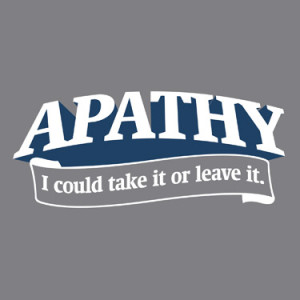Some of my “truisms” come from personal experience in the classroom. As I embark upon my twenty-fifth year of teaching at the college level, I can attest to the accuracy of Snyderian Truism #3, which states,
Ignorance can be corrected, but apathy makes learning impossible.
 The word “ignorance” sometimes gets an undeserved image. To be ignorant is not to be immoral or foolish or stupid or anything necessarily negative with respect to character. It simply means to be uninformed. I have no problem with the task of helping the uninformed come up to speed with the knowledge they need. Isn’t that the basic goal of teaching?
The word “ignorance” sometimes gets an undeserved image. To be ignorant is not to be immoral or foolish or stupid or anything necessarily negative with respect to character. It simply means to be uninformed. I have no problem with the task of helping the uninformed come up to speed with the knowledge they need. Isn’t that the basic goal of teaching?
With respect to the average college student’s grasp of American history, ignorance is nearly epidemic. Most of the students I have in my survey courses have little or no real knowledge of what has occurred in the past. Their understanding of American history is spotty at best, non-existent at times. What they think they know has been filtered through a public education system that has its own agenda, concentrating on the latest trendy topics. The history they’ve received is stuffed with the grievances of minorities, the unfairness of American capitalism, and/or some variant of radical environmentalism.
They know little of the sacrifices made for the current generation, the Biblical principles upon which the culture was based, the concept of the rule of law, or the strides made to correct abuses of the past. They lack context: they don’t know to compare America with other nations throughout history and see some of the stark differences. Consequently, they develop virtually no appreciation for what has preceded their limited time on this earth. For most, history doesn’t go back much further than what they remember personally.
I’ve had more than one student, after taking one of my survey courses, tell me they had no knowledge of almost everything I taught them. A few have even said that I presented the history in a way that contradicted what they learned previously. I distinctly recall one student saying, “Everything you said was good, I was taught was bad, and everything you said was bad, I was taught was good.” Yet all I did was present my interpretation of history based on the most reliable primary sources. I seek accuracy above all.
 So ignorance is not the real problem. It’s apathy that diminishes learning. Ignorance is not a character issue, but apathy is all about character. Although I do my best to make learning enjoyable and interesting, with some students, no matter what I do, there is no desire to learn. One phenomenon I’ve witnessed is that if you have too many apathetic students in a course, their attitude spreads to others and a heavy, oppressive spirit seems to dominate in the classroom.
So ignorance is not the real problem. It’s apathy that diminishes learning. Ignorance is not a character issue, but apathy is all about character. Although I do my best to make learning enjoyable and interesting, with some students, no matter what I do, there is no desire to learn. One phenomenon I’ve witnessed is that if you have too many apathetic students in a course, their attitude spreads to others and a heavy, oppressive spirit seems to dominate in the classroom.
That’s why I make this truism known to them very early in the course. I want them to ponder the implications of their lack of initiative. I hope it will at least challenge them to make an honest effort. There’s nothing better, perhaps, than to hear students tell me later that, for the first time, they actually wanted to learn history—that my challenge to them and my approach to teaching converted their apathy into an active interest in the subject.
God never promised that ministry would be easy. Neither did He promise that everyone would appreciate what we do. Yet it’s all worthwhile when He uses us to reach into the hearts and minds of others. I thank the Lord for this opportunity He has given me.
